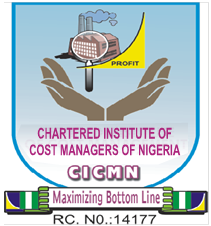Conceptual Framework and Scope of Multi-Discipline Cost Management Practice
CICMN... Building a cost effective and
efficient economy
In the traditional organizational setting, the focus is functional in nature. Generally, in every organization there exist the production function, engineering function, marketing function, Finance function, personnel function, service function and others. There is a de-emphasized cross functional relationship giving rise to functional optimization and sub-optimization of the wider corporate objectives.
This functional organizational structure that was pioneered in the 1920s by US giants like Dupont and General Motors in the industrial age encouraged this trend. In the new age (The Third Wave-information age) as described by Jeremy Hope and Robin Fraser in the book co-authored titled Competing in Third Wave emphases have shifted from managing by function to the management of process across all functions.

Function of utmost imperative for focus beyond functional frontier is the management of cost. The view of cost in the past has always been shifted to the corridors of the finance function i.e accountants particularly management accountants without adequate involvement of all other functions.
According to Robin Cooper, with the emergence of the lean enterprise and increased global competition, companies/organizations must learn to be more proactive in the way they manage costs. For many, survival is dependent upon their abilities to develop sophisticated cost management systems that create intense pressure to reduce costs across the entire value chain. This increased importance of cost management is a central theme of When Lean Enterprises Collide
Firms that adopt a confrontational strategy (an intense form of competition) must become experts at developing low cost, high quality products that have the functionality customers demand A firm that fails to reduce costs as rapidly as its competitors will find its profit margins squeezed and its existence threatened Cost management, like quality, has to become a discipline practiced by virtually every person in the firm. Therefore, overlapping systems that create intense downward pressures on all elements of costs are required……. Robin Cooper.
In the words of the author, as cost management becomes more critical to a company’s survival, two trends emerge. First, new forms of cost management are required, and, second, more individuals in the firm become actively involved in the cost management process.
Some have advocated the mere transformation of the management accountants to be more involved in the management process. To such proponents like Robert Kaplan the management accountants should
- Become part of their organization’s value-added team;
- Participate in the formulation and implementation of strategy;
- Translate strategic intent and capabilities into operational and managerial measures; and
- Move away from being scorekeepers of the past to become the designers of the organization’s critical management information systems.
Notwithstanding the above, the critical importance of cost management to the survival of organization in today’s and future global economy calls for a comprehensive involvement that cuts across all functions. According to Robin Cooper, getting the management accountants more involved in the management process is only part of the story. The rest deals with decentralizing the management accounting process and empowering the workforce. (Irrespective of the discipline). The result is fewer management accountants in the company but a much wider use of management accounting information.
It is important to understand why these changes are occurring. Evidence from some cost management techniques used in highly competitive environments show how the growing importance and application of cost management techniques is changing. Some of such techniques are Activity-Based Cost Management, Target Cost Management, Treatment Protocol, Capacity Management, Process Management etc. To successfully make use of these techniques cost management had to move beyond the frontier of finance function to involve other specialist.
The multidiscipline cost management practice of the Institute of Cost Management, Nigeria, focuses on the empowerment of all the functions in the organization’s structure in order to develop a far reaching cost management mindset that would produce the best practice of cost management. The silos (gap) between the finance function and other functions in the organization with respect to cost management effort is being targeted for elimination in order to effectively empower the corporate operating and managerial workforce for a more result oriented cost management.
The cost management practice of the institute therefore provides opportunity for every person irrespective of the function to be developed in the concepts and practice of cost management. Being conscious of the emerging trend occasioned by globalization of commerce and the need for producers of goods and services to adequately compete and survive the positive influence of this evolution, the issue of given sincere and deliberate attention to the cost of doing business is a sine qua non for all businesses. The practice is therefore going to focus on economic revolution through cost management mindset development cutting across all discipline.
The approaches to the Practice shall not be limited to the private sector only but also to its application in the public sector and its agencies.



